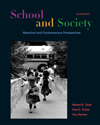 |  School and Society: Historical and Contemporary Perspectives, 4/e Stephen E. Tozer,
The University of Illinois, Chicago
Paul C. Violas
Guy Senese,
Northern Arizona University
Diversity and Equity: Schooling and American Indians
Learning ObjectivesAmong the objectives that Chapter 7 seeks to achieve are these:
| This chapter seeks to exercise students' thinking about how modern liberalism operates in the context of a specific historical problem: the coexistence of European Americans and indigenous Americans in the twentieth century. |
 |  |  | | In considering this, students will need to evaluate the degree to which modern liberal ideology has affected American Indians' efforts to determine their own lives and futures. |
 |  |  | | In particular, students need to consider the conflicts between modern liberal views of progress and Native American commitments to cultural traditions. Students can evaluate the significance of this conflict for educational policy making. They should also evaluate who should have been responsible for determining the education of Native Americans in the twentieth century. |
 |  |  | | Students should analyze the degree to which progressive education as conceived by American government officials was an appropriate response to Native American educational needs. |
 |  |  | | Students should use the careers and thinking of John Collier and Willard Beatty as lenses through which to understand and evaluate the applicability of liberal educational commitments to Native American culture. |
 |  |  | | Students should assess the degree to which cultural pluralism was a more democratic educational and cultural aim than cultural assimilation for American Indians in the first half of the twentieth century. |
|



 2002 McGraw-Hill Higher Education
2002 McGraw-Hill Higher Education